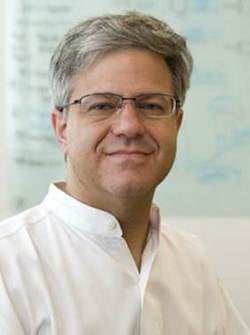 |
|
| Phillip D. Zamore, PhD, a pioneer in the study of RNA silencing, is a fellow of the National Academy of Inventors. |
The University of Massachusetts was ranked 53rd in the world among universities granted U.S. utility patents in 2014, according to a new report released by the National Academy of Inventors (NAI) and the Intellectual Property Owners Association (IPO).
The report, based on data obtained from the U.S. Patent and Trademark Office, recognizes the important role patents play in university research. The NAI and IPO compile the rankings each year by calculating the number of utility patents granted by the U.S. Patent and Trademark Office which list a university as the first assignee on the printed patent.
UMass was granted 40 patents systemwide in the period covered by the rankings; of those, 28 were issued on behalf of UMass Medical School inventors. UMMS inventors were also issued 20 patents in other countries over the same period.
UMMS research discoveries covered by patents issued in 2014 include a number of notable achievements in areas as diverse as infectious disease, surgical instrumentation, vaccine design, wound healing and gene therapy.
“The Medical School recognizes the importance of investing in the patentable discoveries of our scientists,” said James P. McNamara, PhD, executive director of the Office of Technology Management at UMMS. “These initial discoveries become the basis for future licensable products and materials, including therapeutics.”
The National Academy of Inventors was founded in 2010 to recognize and encourage inventors with patents issued from the U.S. Patent and Trademark Office, enhance the visibility of academic technology and innovation, encourage the disclosure of intellectual property, educate and mentor innovative students and translate the inventions of its members to benefit society.